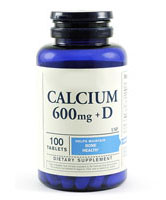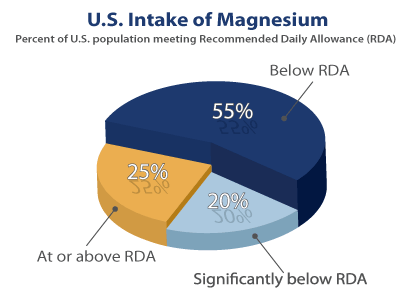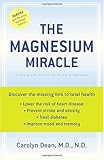Taken from Ancient Minerals
Symptoms of poor magnesium intake can include muscle cramps, facial tics, poor sleep, and chronic pain. It pays to ensure that you get adequate magnesium before signs of deficiency occur.
But how can you know whether you’re getting enough?
According to population studies of average magnesium intake, there’s a good chance that you’re not.
Less than 30% of U.S. adults consume the Recommended Daily Allowance (RDA) of magnesium. And nearly 20% get only half of the magnesium they need daily to remain healthy.1 2 3
Do I get enough magnesium?
One method of assessing your magnesium status is to simply contact your health care provider and request detailed magnesium testing. Yet magnesium assessment is typically done using blood serum testing, and these tests can be misleading. Only 1% of magnesium in the body is actually found in blood, and only .3% is found in blood serum, so clinical blood serum testing may not successfully identify magnesium deficiency.What to do?
Fortunately, it’s possible to get a sense of where your intake may lie simply by asking yourself a few questions about your lifestyle, and watching for certain signs and signals of low magnesium levels.
Learn how to read your signs below, and find out what you can do to ensure magnesium balance and good health. If you answer yes to any of the following questions, you may be at risk for low magnesium intake.
1. Do you drink carbonated beverages on a regular basis?
Most dark colored sodas contain phosphates. These substances actually bind with magnesium inside the digestive tract, rendering it unavailable to the body. So even if you are eating a balanced diet, by drinking soda with your meals you are flushing magnesium out of your system.4 5 6The average consumption of carbonated beverages today is more than ten times what it was in 1940.7 This skyrocketing increase is responsible for both reduced magnesium and calcium availability in the body.8 9
2. Do you regularly eat pastries, cakes, desserts, candies or other sweet foods?

Refined sugar is not only a zero magnesium product but it also causes the body to excrete magnesium through the kidneys. The process of producing refined sugar from sugar cane removes molasses, stripping the magnesium content entirely.
And sugar does not simply serve to reduce magnesium levels. Sweet foods are known by nutritionists as “anti-nutrients”. Anti-nutrients like sweets are foods that replace whole nutritious foods in the diet, yet actually consume nutrients when digested, resulting in a net loss. Because all foods require vitamins and minerals to be consumed in order to power the process of digestion, it’s important to choose foods that “put back” vital nutrients, and then some.
The more sweet foods and processed baked goods you have in your diet, the more likely you are deficient in magnesium and other vital nutrients.
3. Do you experience a lot of stress in your life, or have you recently had a major medical procedure such as surgery?
Both physical and emotional stress can be a cause of magnesium deficiency.Stress can be a cause of magnesium deficiency, and a lack of magnesium tends to magnify the stress reaction, worsening the problem. In studies, adrenaline and cortisol, byproducts of the “fight or flight” reaction associated with stress and anxiety, were associated with decreased magnesium.4
Because stressful conditions require more magnesium use by the body, all such conditions may lead to deficiency, including both psychological and physical forms of stress such as surgery, burns, and chronic disease.
4. Do you drink coffee, tea, or other caffeinated drinks daily?
Magnesium levels are controlled in the body in large part by the kidneys, which filter and excrete excess magnesium and other minerals. But caffeine causes the kidneys to release extra magnesium regardless of body status.If you drink caffeinated beverages such as coffee, tea and soda regularly, your risk for magnesium deficiency is increased.
5. Do you take a diuretic, heart medication, asthma medication, birth control pills or estrogen replacement therapy?
The effects of certain drugs have been shown to reduce magnesium levels in the body by increasing magnesium loss through excretion by the kidneys.6. Do you drink more than seven alcoholic beverages per week?

The effect of alcohol on magnesium levels is similar to the effect of diuretics: it lowers magnesium available to the cells by increasing the excretion of magnesium by the kidneys. In studies, clinical magnesium deficiency was found in 30% of alcoholics.10
Increased alcohol intake also contributes to decreased efficiency of the digestive system, as well as Vitamin D deficiency, both of which can contribute to low magnesium levels.11
7. Do you take calcium supplements without magnesium or calcium supplements with magnesium in less than a 1:1 ratio?
Studies have shown that when magnesium intake is low, calcium supplementation may reduce magnesium absorption and retention.12 13 14 And, whereas calcium supplementation can have negative effects on magnesium levels, magnesium supplementation actually improves the body’s use of calcium.7
Though many reports suggest taking calcium to magnesium in a 2:1 ratio, this figure is largely arbitrary. The ideal ratio for any individual will vary depending on current conditions as well as risk factors for deficiency.
However, several researchers now support a 1:1 calcium to magnesium ratio for improved bone support and reduced risk of disease. This is due not only to the increased evidence pointing to widespread magnesium deficiency, but also concerns over the risk of arterial calcification when low magnesium stores are coupled with high calcium intake.
According to noted magnesium researcher Mildred Seelig:
The body tends to retain calcium when in a magnesium-deficient state. Extra calcium intake at such a time could cause an abnormal rise of calcium levels inside the cells, including the cells of the heart and blood vessels… Given the delicate balance necessary between calcium and magnesium in the cells, it is best to be sure magnesium is adequate if you are taking calcium supplements.”8
8. Do you experience any of the following:
- Anxiety?
- Times of hyperactivity?
- Difficulty getting to sleep?
- Difficulty staying asleep?
9. Do you experience any of the following:
- Painful muscle spasms?
- Muscle cramping?
- Fibromyalgia?
- Facial tics?
- Eye twitches, or involuntary eye movements?
Without magnesium, our muscles would be in a constant state of contraction.
Magnesium is a required element of muscle relaxation, and without it our muscles would be in a constant state of contraction. Calcium, on the other hand, signals muscles to contract. As noted in the book The Magnesium Factor, the two minerals are “two sides of a physiological coin; they have actions that oppose one another, yet they function as a team.”8
Chvostek’s Sign and Trousseau’s Sign are both clinical tests for involuntary muscle movements, and both may indicate either calcium or magnesium deficiency, or both. In fact, magnesium deficiency may actually appear as calcium deficiency in testing, and one of the first recommendations upon receiving low calcium test results is magnesium supplementation.
10. Did you answer yes to any of the above questions and are also age 55 or older?
Older adults are particularly vulnerable to low magnesium status. It has been shown that aging, stress and disease all contribute to increasing magnesium needs, yet most older adults actually take in less magnesium from food sources than when they were younger.In addition, magnesium metabolism may be less efficient as we grow older, as changes the GI tract and kidneys contribute to older adults absorbing less and retaining less magnesium.15
If you are above 55 and also showing lifestyle signs or symptoms related to low magnesium, it’s particularly important that you work to improve your magnesium intake. When body stores of magnesium run low, risks of overt hypomagnesaemia (magnesium deficiency) increase significantly.
How can you know for certain if you have a deficiency?
Magnesium’s impact is so crucial and far reaching that symptoms of its absence reverberate throughout the body’s systems. This makes signs of its absence hard to pin down with absolute precision, even for cutting edge researchers. Doctors Pilar Aranda and Elena Planells noted this difficulty in their report at the International Magnesium Symposium of 2007:The clinical manifestations of magnesium deficiency are difficult to define because depletion of this cation is associated with considerable abnormalities in the metabolism of many elements and enzymes. If prolonged, insufficient magnesium intake may be responsible for symptoms attributed to other causes, or whose causes are unknown.”Among researchers, magnesium deficiency is known as the silent epidemic of our times, and it is widely acknowledged that definitive testing for deficiency remains elusive. Judy Driskell, Professor, Nutrition and Health Sciences at the University of Nebraska, refers to this “invisible deficiency” as chronic latent magnesium deficiency, and explains:
Normal serum and plasma magnesium concentrations have been found in individuals with low magnesium in [red blood cells] and tissues. Yet efforts to find an indicator of subclinical magnesium status have not yielded a cost-effective one that has been well validated.”16Yet while the identification of magnesium deficiency may be unclear, its importance is undeniable.
Magnesium activates over 300 enzyme reactions in the body, translating to thousands of biochemical reactions happening on a constant basis daily. Magnesium is crucial to nerve transmission, muscle contraction, blood coagulation, energy production, nutrient metabolism and bone and cell formation.
Considering these varied and all-encompassing effects, not to mention the cascading effect magnesium levels have on other important minerals such as calcium and potassium, one thing is clear – long term low magnesium intake is something to be avoided.
What can you do to increase magnesium intake?
The longer your intake remains low, the more likelihood your bodily stores will be diminished, leaving you exposed to some of the more troubling side effects of long term deficiency. According to Dr. Carolyn Dean, M.D., N.D., and expert on magnesium therapy, adequate magnesium can improve heart health, prevent stroke and obesity, and improve mood and memory.If you answered no to all of the above questions, you may be able to rely on high food sources of magnesium, like those described in our article on Magnesium in the Diet.
Yet for many people, especially those with diseases and symptoms associated with low magnesium, active magnesium supplementation may be a crucial element of returning to good health.
In her book, The Magnesium Miracle, Dr. Dean notes that achieving adequate magnesium through foods is notoriously difficult, stating:
I’m convinced that to get enough magnesium today, you need to take supplements.”4One of the most effective ways to improve your magnesium levels is to combine a healthy diet with transdermal magnesium.
Many of the factors which contribute to low magnesium stores are caused by inefficiencies of the GI tract. By delivering magnesium through the skin directly to the cells, topical magnesium products bypass many of the problems associated with low magnesium absorption.
In older adults, reduced gastric acid levels in the digestive system may be a factor in reduced mineral availability. Hydrochloric acid supplements may be combined with magnesium to combat this dilemma; however a simpler and less expensive option is the use of magnesium chloride supplements. Magnesium chloride has been proven to have a high bioavailability, while simultaneously providing the chloride necessary for healthy digestion and vitamin and mineral absorption.
Magnesium researcher Mildred Seelig has called magnesium “the silent guardian of our hearts and arteries” and “necessary for life”. And Dr. Carolyn Dean calls it “the missing link to total health”.
If you haven’t heard much about magnesium and its importance to good health, now is the time to learn. And if it’s something you’ve always meant to look into, now is the time to take action!
What’s Next?
Magnesium through the skin? Yes! Learn about topical magnesium products.Why can’t you get enough magnesium through foods? Get the good news and the bad news.
Watch health experts’ video interviews — powerful commentary on the why and how of magnesium.
References:
- Combs GF, Nielsen FH. Health significance of calcium and magnesium: Examples from human studies. In: World Health Organization. Calcium and Magnesium in Drinking Water: Public health significance. Geneva: World Health Organization Press; 2009. [↵]
- Pao EM, Mickle SJ. Problem nutrients in the United States. Food Technology. 1981:35:58-79. [↵]
- King DE, Mainous AG 3rd, Geesey ME, Woolson RF. Dietary magnesium and C-reactive protein levels. Journal Of The American College Of Nutrition. 2005 Jun;24(3):166-71. Available from: MEDLINE with Full Text, Ipswich, MA. Accessed November 6, 2009. [↵]
- Dean C. The Magnesium Miracle. New York: Ballantine Books; 2007. [↵] [↵] [↵]
- Weiss GH, Sluss PM, Linke CA. Changes in urinary magnesium, citrate and oxalate levels due to cola consumption. Urology 1992;39:331-3. [↵]
- Brink E. J., Beynen A. C., Dekker P. R., Beresteijn E.C.H., Meer R. Interaction of calcium and phosphate decreases ileal magnesium solubility and apparent magnesium absorption. The Journal of Nutrition. 1992; 122:580-586 [↵]
- Vartanian L, Schwartz, M, Brownell, K. Effects of Soft Drink Consumption on Nutrition and Health: A Systematic Review and Meta-Analysis. American Journal of Public Health. 2007;97(4):667-675. [↵] [↵]
- Seelig M, Rosanoff A. The Magnesium Factor. New York: Avery Books; 2003. [↵] [↵] [↵]
- Heaney RP, Rafferty K. Carbonated beverages and urinary calcium excretion. American Journal of Clinical Nutrition. 2001; 74:343–347. [↵]
- Irwin R, Rippe J. Irwin and Rippe’s Intensive Care Medicine. Philadelphia: Lippincott, Williams and Wilkins; 2008. [↵]
- Shane SR, Flink EB. Magnesium deficiency in alcohol addiction and withdrawal. Magnesium and trace elements. 1991-1992;10(2-4):263-8. [↵]
- Wester PO. Magnesium. American Journal of Clinical Nutrition. 1987; 45:1305-12. [↵]
- Norman DA, Fordtran JS, Brinkley U, et al. Jejunal and ileal adaptation to alterations in dietary calcium. The Journal of Clinical Investigation. 1981 ;67: 1599-603. [↵]
- Seelig MS. The requirement of magnesium by the normal adult: Summary and analysis of published data. American Journal of Clinical Nutrition. 1964;14:342-90. [↵]
- Bernstein A, Luggen AS. Nutrition for the Older Adult. Sudbury, MA: Jones and Bartlett Publishers; 2010. [↵]
- Driskell J. Nutrition and Exercise Concerns of Middle Age. Boca Raton, FL: CRC Press; 2009. [↵]
What does Magnesium do?!?!
Taken from Natural Vitality
Magnesium and calcium are fundamental nutrients that need to be in balance with each other in order for you to fully experience good health. Their importance on a cellular level is critical. Calcium and magnesium are like opposite sides of a coin. Calcium excites nerves, while magnesium calms them down. Calcium makes muscles contract. Magnesium is necessary for muscles to relax. Calcium is needed for blood clotting, but magnesium keeps the blood flowing freely.
Calcium & Magnesium:
A Matter of Balance
You experience the tensing (calcium) and relaxing (magnesium) interaction of these two elements each time your heart beats, when you feel your pulse, and every time you breathe.
When we are under stress, our cells—which in their resting state contain magnesium—go through a change. Calcium, normally outside the cells, enters the cells and the calcium level becomes high. This is the action state in which a muscle cell, for example, will contract and tense the muscle. The magnesium then pushes the calcium out of the cell and the cell is again in its resting, relaxed state. Think of it as an on-off switch. The “off” is magnesium and the “on” is calcium.
But what happens to a cell that is not in balance—where the magnesium level in the body is deficient?
In simple terms, the “off” switch doesn’t fully turn off. That means calcium can continuously leak into the cells and stimulate cell activity (the “on” switch). The result is stress accompanied by one or more of the magnesium deficiency symptoms.
Magnesium helps your muscles and nerves function properly; it keeps your heart rhythm steady, supports a healthy immune system and also assists in keeping your bones strong. This essential mineral helps regulate blood sugar levels, promotes normal blood pressure and is required for producing and storing energy. It’s easy to see why many researchers say that no single dietary factor is as critical as magnesium.
Calcium—Too Much of a Good Thing?
Calcium deficiency can be a serious issue. It is an important nutrient your body needs every day, but too much calcium can also be a problem.
The recommended adequate intake of calcium according to the National Institutes of Health, Office of Dietary Supplements, is 1,000 mg for adults aged 19–50 and 1,200 mg for 51 plus. There are many adults who are taking 1,200–1,500 mg of supplemental calcium in addition to their dietary intake of calcium (an 8 oz cup of low-fat fruit yogurt contains 345 mg of calcium and one cup of nonfat milk contains 306 mg). Unassimilated calcium can end up in the soft tissues of the body where it deposits and hardens (calcifies) or in the urine where it may result in kidney stones.
Unless calcium and magnesium are properly balanced, magnesium becomes depleted (too much calcium can itself deplete magnesium levels). This can result in an inability to quickly recover from stress and can itself be a source of stress.
Do You Have a Healthy Magnesium Level?
Most people don’t get enough magnesium, including many who already take magnesium. There are two reasons for this: the amount of magnesium required by the body is greater than people think and many magnesium capsules and tablets are not completely absorbed by the body.
Magnesium deficiency can be caused by a number of stresses on the body, including—but not limited to—lack of adequate dietary magnesium, emotional stress, some drugs (diuretics, antibiotics, oral contraceptives, insulin, cortisone), heavy exercise, diabetes, gastrointestinal disorders and too much calcium in the diet.
A Matter of Balance
You experience the tensing (calcium) and relaxing (magnesium) interaction of these two elements each time your heart beats, when you feel your pulse, and every time you breathe.
When we are under stress, our cells—which in their resting state contain magnesium—go through a change. Calcium, normally outside the cells, enters the cells and the calcium level becomes high. This is the action state in which a muscle cell, for example, will contract and tense the muscle. The magnesium then pushes the calcium out of the cell and the cell is again in its resting, relaxed state. Think of it as an on-off switch. The “off” is magnesium and the “on” is calcium.
But what happens to a cell that is not in balance—where the magnesium level in the body is deficient?
In simple terms, the “off” switch doesn’t fully turn off. That means calcium can continuously leak into the cells and stimulate cell activity (the “on” switch). The result is stress accompanied by one or more of the magnesium deficiency symptoms.
Magnesium helps your muscles and nerves function properly; it keeps your heart rhythm steady, supports a healthy immune system and also assists in keeping your bones strong. This essential mineral helps regulate blood sugar levels, promotes normal blood pressure and is required for producing and storing energy. It’s easy to see why many researchers say that no single dietary factor is as critical as magnesium.
Calcium—Too Much of a Good Thing?
Calcium deficiency can be a serious issue. It is an important nutrient your body needs every day, but too much calcium can also be a problem.
The recommended adequate intake of calcium according to the National Institutes of Health, Office of Dietary Supplements, is 1,000 mg for adults aged 19–50 and 1,200 mg for 51 plus. There are many adults who are taking 1,200–1,500 mg of supplemental calcium in addition to their dietary intake of calcium (an 8 oz cup of low-fat fruit yogurt contains 345 mg of calcium and one cup of nonfat milk contains 306 mg). Unassimilated calcium can end up in the soft tissues of the body where it deposits and hardens (calcifies) or in the urine where it may result in kidney stones.
Unless calcium and magnesium are properly balanced, magnesium becomes depleted (too much calcium can itself deplete magnesium levels). This can result in an inability to quickly recover from stress and can itself be a source of stress.
Do You Have a Healthy Magnesium Level?
Most people don’t get enough magnesium, including many who already take magnesium. There are two reasons for this: the amount of magnesium required by the body is greater than people think and many magnesium capsules and tablets are not completely absorbed by the body.
Magnesium deficiency can be caused by a number of stresses on the body, including—but not limited to—lack of adequate dietary magnesium, emotional stress, some drugs (diuretics, antibiotics, oral contraceptives, insulin, cortisone), heavy exercise, diabetes, gastrointestinal disorders and too much calcium in the diet.



No comments:
Post a Comment